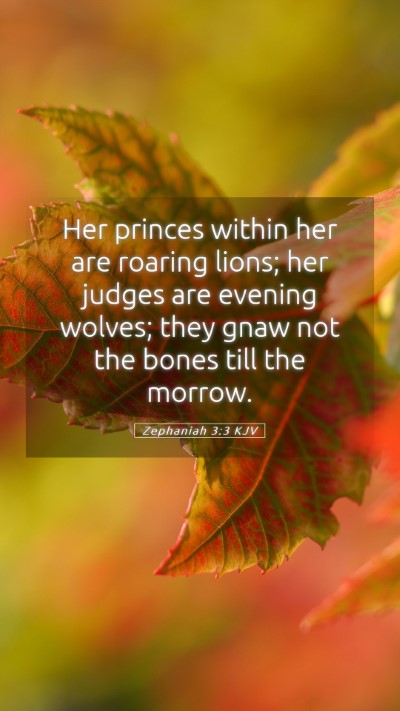Old Testament
Genesis Exodus Leviticus Numbers Deuteronomy Joshua Judges Ruth 1 Samuel 2 Samuel 1 Kings 2 Kings 1 Chronicles 2 Chronicles Ezra Nehemiah Esther Job Psalms Proverbs Ecclesiastes Song of Solomon Isaiah Jeremiah Lamentations Ezekiel Daniel Hosea Joel Amos Obadiah Jonah Micah Nahum Habakkuk Zephaniah Haggai Zechariah MalachiZephaniah 3:3 Meaning
What is the meaning of Zephaniah 3:3?
Her princes within her are roaring lions; her judges are evening wolves; they gnaw not the bones till the morrow.
Zephaniah 3:3 Bible Verse Meaning
Bible Verse Meaning and Interpretation of Zephaniah 3:3
Zephaniah 3:3 reads: "Her princes within her are roaring lions; her judges are evening wolves; they gnaw not the bones till the morrow." This verse presents a vivid picture of the corrupt leadership in Jerusalem, symbolizing the spiritual and moral decay that pervades the city at the time.
This commentary provides a careful examination of the verse’s meaning, drawing insights from reputable public domain sources, including Matthew Henry, Albert Barnes, and Adam Clarke. Below is a comprehensive analysis of the verse, elucidating its significance and implications.
Contextual Background
The Book of Zephaniah is a prophetic text that addresses the impending judgment of God upon His people due to their sins and rebellion. Zephaniah prophesies during the reign of King Josiah, highlighting the rampant corruption and idolatry prevalent in Judah.
Mattew Henry's Commentary
Matthew Henry emphasizes the metaphorical use of “roaring lions” and “evening wolves” to portray the brutality and voracity of the leaders. He contrasts the predatory nature of these animals with the expectation of righteous governance. The mention of “gnaw not the bones till the morrow” indicates a complete disregard for the welfare of the people they are meant to serve.
Albert Barnes Commentary
Albert Barnes elaborates on the imagery, noting that the “roaring lions” represent the cruel ruling class who terrorize the innocents. The use of “evening wolves” suggests a predatory nature that emerges at night, emblematic of stealthy and deceptive practices. Barnes highlights that this verse serves as a critique of the authorities who exploit and oppress the vulnerable.
Adam Clarke's Commentary
Adam Clarke offers a detailed linguistic analysis, pondering on the implications of the terms used. He suggests that the “princes” and “judges” are situated in stark contrast to their intended roles as protectors and enforcers of justice. Clarke asserts that their actions reflect a society plagued by moral failings, where leaders act for their gain rather than for the common good.
Analysis of Leadership and Corruption
The verse encapsulates the essence of corrupt leadership, where those in power are likened to ferocious animals with no regard for ethical governance. This imagery serves to warn both contemporary leaders and civil authorities about the dangers of power devoid of justice and compassion.
Spiritual Implications
In a broader spiritual context, Zephaniah 3:3 defines the characteristics of leaders who fail to live up to God’s standards. This verse urges a reflection on the qualities required for righteous leadership, which should prioritize integrity, honesty, and the well-being of the governed.
Application in Daily Life
For modern readers, this verse can be applied in numerous ways:
- Self-reflection: Evaluating our actions and decisions in leadership roles.
- Vigilance: Being aware of ethical practices in our communities and governments.
- Advocacy: Advocating for justice and integrity in leadership.
- Community Engagement: Engaging with local leaders and holding them accountable.
Related Scriptures
- Jeremiah 22:13-17: A condemnation of corrupt rulers.
- Ezekiel 22:27: A description of rulers as wolves who tear the flock.
- Proverbs 28:15: A warning about wicked princes.
Conclusion
In summary, Zephaniah 3:3 serves as a powerful reminder of the need for righteousness in leadership and the consequences of failing to uphold justice. The insights drawn from various commentaries deepen our understanding of Scripture and encourage us to reflect on the state of leadership in our own lives and communities.
This analysis serves not only to enhance our Bible verse understanding and Bible verse interpretations but also aids in Bible studies, online Bible study, and discussions within Bible study groups. Through such meticulous study, we can grasp the deeper meanings of Bible verses and apply them thoughtfully in our daily existence.


